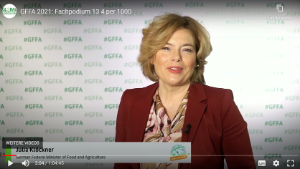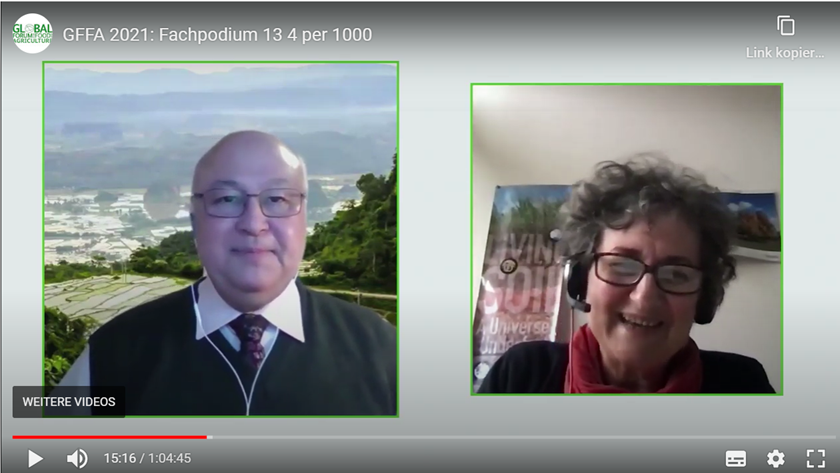Healthy soils to combat climate change and end hunger
On January 21, 2021, the expert panel "Healthy Soils to Combat Climate Change and End Hunger" of the "4 per 1000" initiative was held as part of GFFA 2021. It was moderated by Dr. Paul Luu, Executive Secretary of the "4 per 1000" initiative. The Federal Minister of Food and Agriculture, Julia Klöckner, highlighted the importance of healthy soils and emphasized the importance of the "4 per 1000" initiative in an opening video. Wolfgang Zornbach, Head of Unit for Sustainability, Climate Protection and Climate Impacts at the German Federal Ministry of Food and Agriculture, emphasized the importance of carbon in soil in his speech, comparing it to a diamond.
The panel was composed of representatives from four different stakeholder groups. Keynote speeches by the panelists were followed by a lively discussion.
Moderator
Dr. Paul Luu, Executive Secretary of the "4 per 1000" Initiative
Welcome by
Julia Klöckner. The Federal Minister of Food and Agriculture
Introduction by
Wolfgang Zornbach, Head of Unit for Sustainability, Climate Protection and Climate Impacts at the German Federal Ministry of Food and Agriculture
Videos
The introductional video of the german minster Klöckner:
You can find the recording of the whole panel here:
Our Panelists
Claire Chenu
Research and Education
Member of the "4 per 1000" Scientific and Technical Committee and coordinating EJP SOIL
Victoria Prentis
Governments and Local Authorities
Under-Secretary of State for Farming, Fisheries and Food, UK
Natacha Agbo
Farmers organizations & NGO and Civil Society
African Innovation Services - AFRI
Twin Regions from the perspective of Benin
Key Messages
- Soil is a diamond we need to polish carefully for the generations to come
- Soil health is important for mitigation, adaptation and food security
- 4p1000, backed up by solid scientific findings, is one of the major instruments for the implementation of Paris Agreement
- In order to reverse the severe soil degaration globally, we need to improve our soil policy with the goal of paying farmers for taking care of soils
- The concept of twin regions, and in particular an implementation of it between Africa and Europe, raises major interest as an instrument to achieve climate justice and international solidarity through the large-scale transformation to soil regeneration, agroecology and sustainable land management practices
- Living labs as a research approach with NGOs as key partners can bring the research and the farmers community closer together enabling realistic development of local solutions to ensure soil health and carbon sequestration
Conference of Agriculture Ministers 22.01.2021
On the last day of the GFFA, 76 agriculture ministers agreed on a final communiqué at the conference of agriculture ministers. The communiqué states, among other things:
"We, as agriculture ministers, recognise our responsibility to take climate action while ensuring the provision of adequate and sustainably produced food for the world’s population. In this regard, we stress the UNFCCC principle of common but differentiated responsibilities and respective capabilities, in the light of different national circumstances. We stress that agriculture is particularly vulnerable to climate change and at the same time part of the climate solution. We will do our part to reform domestic policies on agriculture, to promote and steer investment towards sustainable agricultural practices that support climate-change adaptation and mitigation. Appropriate and sustainable agriculture approaches contribute to climate change mitigation and adaptation. For example, permanent grasslands, wetlands, good soil cultivation, soil husbandry, sustainable forest management and sustainable land management protect valuable carbon stocks, contribute to sequestering significant amounts of carbon, increase soil health, and can limit deforestation, prevent ecosystem degradation and provide eco-system services."
The following goals were agreed upon:
- Intensify efforts to achieve the UN Agenda 2030 goal of "No Hunger" despite COVID-19.
- In the COVID-19 pandemic, to maintain food production, keep markets open and food chains functioning.
- To prevent future pandemics, support the "One Health" approach, strengthen animal health, create resilient animal health systems, and improve health management for wild species.
- To contribute to climate change mitigation, improve carbon sequestration in soils, combat further deforestation of our forests, reduce food loss and waste
- To help agriculture adapt to climate change through water, biodiversity, breeding and livestock measures.
- Support the approach to integrated, sustainable and resilient food systems, contributing to the UN Food Systems Summit 2021.
Survey
Please share your opinion.













